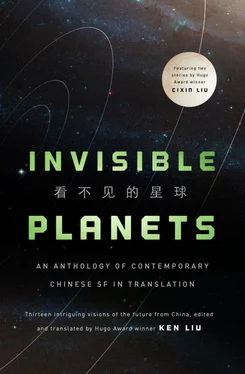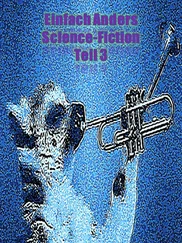But Grandpa himself needed a caretaker, too. Who was supposed to care for the caretaker?
Furthermore, Grandpa came up with the idea that when Grandpa Zhao recovered, he’d teach Grandpa Zhao how to operate the telepresence equipment. The two old men would be able to care for each other, and they would have no need of other caretakers.
Grandpa Zhao thought this was a great idea. But both families thought the plan absurd. Even Uncle Wang had to think about it for a while and then said, “Um… I have to report this situation to my supervisors.”
Tongtong thought hard about this. Playing chess through Ah Fu was simple to understand. But caring for each other through Ah Fu? The more she thought about it, the more complicated it seemed. She was sympathetic to Uncle Wang’s confusion.
Sigh, Grandpa is just like a little kid. He won’t listen to Mom and Dad at all.
* * *
Grandpa now stayed in his room all the time. At first, Tongtong thought he was still mad at her parents. But then, she found that the situation had changed completely.
Grandpa got really busy. Once again, he started seeing patients. No, he didn’t go to the clinic; instead, using his telepresence kit, he was operating Ah Fus throughout the country and showing up in other elders’ homes. He would listen to their complaints, feel their pulse, examine them, and write out prescriptions. He also wanted to give acupuncture treatments through Ah Fus, and to practice this skill, he operated his own Ah Fu to stick needles in himself!
Uncle Wang told Tongtong that Grandpa’s innovation could transform the entire medical system. In the future, maybe patients no longer needed to go to the hospital and waste hours in waiting rooms. Doctors could just come to your home through an Ah Fu installed in each neighborhood.
Uncle Wang said that Guokr’s R&D department had formed a dedicated task force to develop a specialized, improved model of Ah Fu for such medical telepresence applications, and they invited Grandpa on board as a consultant. So Grandpa got even busier.
Since Grandpa’s legs were not yet fully recovered, Uncle Wang was still caring for him. But they were working on developing a web-based system that would allow anyone with some idle time and interest in helping others to register to volunteer. Then the volunteers would be able to sign on to Ah Fus in homes across the country to take care of elders, children, patients, pets, and to help in other ways.
If the plan succeeded, it would be a step to bring about the kind of golden age envisioned by Confucius millennia ago: “And then men would care for all elders as if they were their own parents, love all children as if they were their own children. The aged would grow old and die in security; the youthful would have opportunities to contribute and prosper; and children would grow up under the guidance and protection of all. Widows, orphans, the disabled, the diseased—everyone would be cared for and loved.”
Of course, such a plan had its risks: privacy and security, misuse of telepresence by criminals, malfunctions and accidents, just for starters. But since the technological change was already here, it was best to face the consequences and guide them to desirable ends.
There were also developments no one had anticipated.
Uncle Wang showed Tongtong lots of web videos: Ah Fus were shown doing all kinds of interesting things: cooking, taking care of children, fixing the plumbing and electric systems around the house, gardening, driving, playing tennis, even teaching children the arts of Go and calligraphy and seal carving and erhu playing…
All of these Ah Fus were operated by elders who needed caretakers themselves, too. Some of them could no longer move about easily, but still had sharp eyes and ears and minds; some could no longer remember things easily, but they could still replicate the skills they had perfected in their youth; and most of them really had few physical problems, but were depressed and lonely. But now, with Ah Fu, everyone was out and about, doing things.
No one had imagined that Ah Fu could be put to all these uses. No one had thought that men and women in their seventies and eighties could still be so creative and imaginative.
Tongtong was especially impressed by a traditional folk music orchestra made up of more than a dozen Ah Fus. They congregated around a pond in a park and played enthusiastically and loudly. According to Uncle Wang, this orchestra had become famous on the web. The operators behind the Ah Fus were men and women who had lost their eyesight, and so they called themselves “The Old Blinds.”
“Tongtong,” Uncle Wang said, “your grandfather has brought about a revolution.”
Tongtong remembered Mom had often mentioned that Grandpa was an old revolutionary. “He’s been working for the revolution all his life; it’s time for him to take a break.” But wasn’t Grandpa a doctor? When did he participate in a “revolution”? And just what kind of work was “working for the revolution” anyway? And why did he have to do it all his life?
Tongtong couldn’t figure it out, but she thought “revolution” was a splendid thing. Grandpa now once again seemed like the Grandpa she had known.
* * *
Every day Grandpa was full of energy and spirit. Whenever he had a few moments to himself, he preferred to sing a few lines of traditional folk opera:
Outside the camp, they’ve fired off the thundering cannon thrice,
And out of Tianbo House walks the woman who will protect her homeland.
The golden helmet sits securely over her silver-white hair,
The old iron-scaled war robe once again hangs on her shoulders.
Look at her battle banner, displaying proudly her name:
Mu Guiying, at fifty-three, you are going to war again!
Tongtong laughed. “But, Grandpa, you’re eighty-three!”
Grandpa chuckled. He stood and posed as if he were an ancient general holding a sword as he sat on his warhorse. His face glowed red with joy.
In another few days, Grandpa would be eighty-four.
* * *
Tongtong played by herself at home.
There were dishes of cooked food in the fridge. In the evening, Tongtong took them out, heated them up, and ate by herself. The evening air was heavy and humid, and the cicadas cried without cease.
The weather report said there would be thunderstorms.
A blue light flashed three times in a corner of the room. A figure moved out of the corner noiselessly: Ah Fu.
“Mom and Dad took Grandpa to the hospital. They haven’t returned yet.”
Ah Fu nodded. “Your mother sent me to remind you: don’t forget to close the windows before it rains.”
Together, the robot and the girl closed all the windows in the house. When the thunderstorm arrived, the raindrops struck against the windowpanes like drumbeats. The dark clouds were torn into pieces by the white-and-purple flashes of lightning, and then a bone-rattling thunder rolled overhead, making Tongtong’s ears ring.
“You’re not afraid of thunder?” asked Ah Fu.
“No. You?”
“I was afraid when I was little, but not now.”
An important question came to Tongtong’s mind. “Ah Fu, do you think everyone has to grow up?”
“I think so.”
“And then what?”
“And then you grow old.”
“And then?”
Ah Fu didn’t respond.
They turned on the video wall to watch cartoons. It was Tongtong’s favorite show, Rainbow Bear Village . No matter how heavily it rained outside, the little bears of the village always lived together happily. Maybe everything else in the world was fake; maybe only the world of the little bears was real.
Gradually Tongtong’s eyelids grew heavy. The sound of rain had a hypnotic effect. She leaned against Ah Fu. Ah Fu picked her up in his arms, carried her into the bedroom, set her down gently in bed, covered her with a blanket, and pulled the curtains shut. His hands were just like real hands, warm and soft.
Читать дальше












